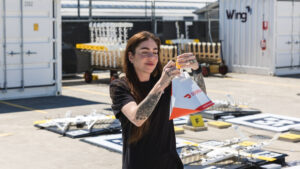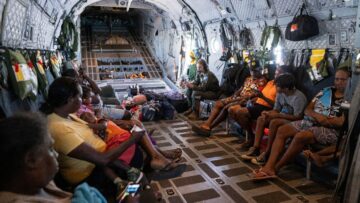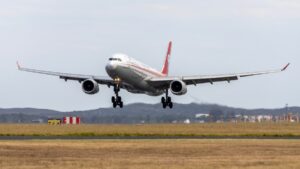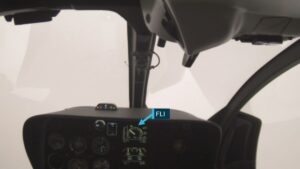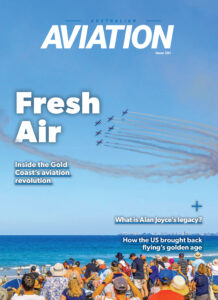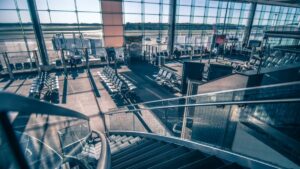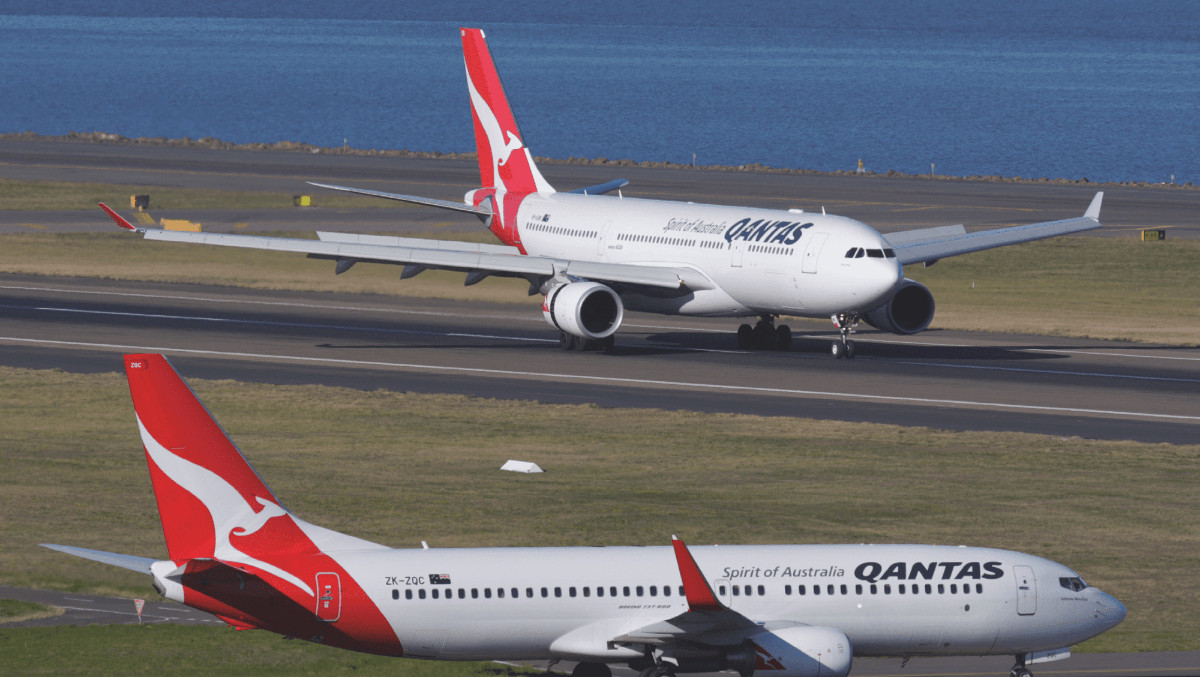
Qantas has accused Sydney Airport of “demonising” its “biggest customer” as it responded to claims it’s hoarding the most lucrative take-off slots to block out smaller rivals.
In a significant intervention, the airline’s domestic CEO, Andrew David, blamed bad weather and ATC staffing issues for its high cancellation rate, adding that any suggestion the Flying Kangaroo is playing the system is “simply wrong”.
It comes after the ACCC in June argued that larger airlines “can exploit” slot rules to stifle competition from smaller carriers before Sydney Airport’s CEO dramatically told larger airlines to either use their slots or give them up.
A slot is a literal time slot that allows an airline to take off at a specific airport at a particular time.
Currently, an airline can hold a time slot at an airport indefinitely as long as it flies it 80 per cent of the time, allowing carriers to cancel up to a fifth and block out rivals from the best times.
However, Qantas has now followed Virgin to formally deny any suggestion it’s gaming the system.
Instead, the carrier again pointed the finger at bad weather and Airservices Australia ATC staffing issues for recent high cancellation rates and said that Sydney’s independent slot system manager had returned 99 per cent of Qantas slots in the most recent completed season.
“This says two things: that we use our slots and, when we don’t, we lose them,” Qantas said.
PROMOTED CONTENT
“Sydney Airport is clearly frustrated at airline cancellations because it means lost revenue for them. (It typically means the same for Qantas, as well as significant costs that are paid regardless.)
“It’s worth noting that Qantas (which has its main operational hub in Sydney) has had the highest level of on-time performance of the major domestic airlines for 10 months in a row and the lowest level of cancellations nationally for the past 12 months.”
Domestic CEO David then dismissed accusations that Qantas is hoarding take-off slots as “simply wrong”.
“It’s a use it or lose it system with a buffer for operational issues that you’d expect when you’re getting planes in the sky with all sorts of weather and runway restrictions, and that’s no different from many airports around the world,” he said.
“There does seem to be some misdirected frustration from Sydney Airport because they wish the system was different and they could unlock more revenue. We understand that, but we’re not sure demonising your biggest customer is the way to go about it.
“We’d much prefer to work cooperatively with Sydney Airport on this, especially after what the whole industry has been through over the past few years.”
In its statement, Qantas accused Sydney Airport of wanting to boost its international flights at the expense of domestic flights to increase revenue.
“Passengers flying internationally typically spend more time in the terminal, are more likely to eat and drink there and might also buy some duty free – all things that drive significant revenue for Sydney Airport,” the Flying Kangaroo said.
“Aircraft that operate international flights tend to be larger. The same slot that can be used by an aircraft with under 100 seats is worth a lot more to Sydney Airport if it is instead used by a 450-seat A380 because their revenue is largely built on a per-passenger basis.
“There’s nothing wrong with Sydney Airport looking for ways to legitimately increase its revenue, but it shouldn’t try to nudge domestic carriers out of legitimately held slots in the process.”
It retort came after Sydney Airport CEO Culbert blamed steep airfares and “high cancellation rates on popular domestic routes” for suppressing passenger demand.
“In the 12 months to June, passenger numbers on the Sydney to Melbourne route were just 81 per cent recovered compared to pre-pandemic levels, while numbers between Sydney and Canberra were only 64 per cent recovered,” he said.
“It will be interesting to see if this is a long-term trend. If incumbent airlines have decided to fly less between key domestic markets, then they should relinquish slots to domestic and international carriers who want to operate out of Sydney Airport and provide more choice for customers.”
- SEO Powered Content & PR Distribution. Get Amplified Today.
- PlatoData.Network Vertical Generative Ai. Empower Yourself. Access Here.
- PlatoAiStream. Web3 Intelligence. Knowledge Amplified. Access Here.
- PlatoESG. Automotive / EVs, Carbon, CleanTech, Energy, Environment, Solar, Waste Management. Access Here.
- BlockOffsets. Modernizing Environmental Offset Ownership. Access Here.
- Source: https://australianaviation.com.au/2023/07/simply-wrong-to-say-were-hoarding-slots-qantas-tells-sydney-airport/
- :has
- :is
- :not
- $UP
- 10
- 100
- 12
- 12 months
- 80
- a
- A380
- About
- about IT
- Accusations
- accused
- adding
- After
- again
- aircraft
- airline
- Airlines
- airport
- Airports
- All
- Allowing
- allows
- also
- an
- and
- Andrew
- any
- ARE
- argued
- around
- AS
- At
- Australia
- Bad
- basis
- BE
- because
- been
- before
- BEST
- between
- Biggest
- Block
- boost
- buffer
- built
- but
- buy
- by
- came
- CAN
- carriers
- ceo
- choice
- claims
- clearly
- COM
- comes
- compared
- competition
- Completed
- Costs
- could
- customer
- Customers
- David
- decided
- Demand
- different
- does
- Domestic
- Dont
- dramatically
- Drink
- drive
- eat
- either
- especially
- expect
- few
- fifth
- Flights
- flying
- followed
- For
- Formally
- Free
- from
- frustrated
- frustration
- gaming
- getting
- Give
- Go
- had
- Have
- he
- Held
- High
- highest
- hoarding
- hold
- HTTPS
- Hub
- if
- in
- Increase
- Incumbent
- independent
- industry
- instead
- interesting
- International
- internationally
- intervention
- issues
- IT
- ITS
- june
- just
- Key
- largely
- larger
- less
- Level
- levels
- likely
- Long
- long-term
- looking
- lose
- lost
- Lot
- lowest
- lowest level
- lucrative
- Main
- major
- manager
- many
- Markets
- means
- Melbourne
- might
- months
- more
- most
- much
- nationally
- no
- nothing
- noting
- now
- numbers
- of
- off
- on
- only
- operate
- operational
- or
- our
- out
- over
- paid
- particular
- past
- per
- performance
- Planes
- plato
- Plato Data Intelligence
- PlatoData
- playing
- Popular
- prefer
- process
- provide
- Rate
- Rates
- recent
- Regardless
- restrictions
- revenue
- rivals
- Route
- ROW
- runway
- Said
- same
- say
- says
- Season
- see
- seem
- should
- significant
- sky
- slots
- smaller
- some
- specific
- spend
- staffing
- Statement
- stifle
- suppressing
- sure
- sydney
- system
- Take
- Terminal
- that
- The
- the world
- their
- Them
- then
- There.
- they
- things
- this
- Through
- time
- times
- to
- Trend
- try
- two
- typically
- under
- understand
- unlock
- use
- used
- want
- wanting
- was
- Way..
- ways
- we
- Weather
- WELL
- were
- What
- when
- which
- while
- WHO
- whole
- will
- with
- Work
- world
- worth
- Wrong
- years
- Your
- zephyrnet

